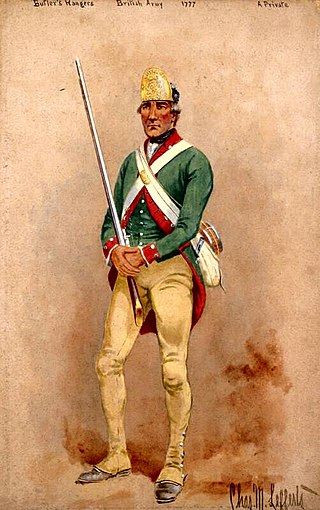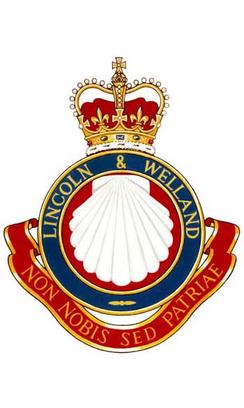
Lieutenant-Colonel John Butler was a British Indian Department officer, landowner and merchant. During the American Revolutionary War, he was a prominent Loyalist who commanded Butler's Rangers. Born in New London, Connecticut, he moved to New York with his family, where he learned several Iroquoian languages and worked as an interpreter in the fur trade. He was well-prepared to work with the Mohawk and other Iroquois nations who became allies of the British during the rebellion.

Butler's Rangers (1777–1784) was a Loyalist provincial military unit of the American Revolutionary War, raised by American loyalist John Butler. Most members of the regiment were Loyalists from upstate New York and northeastern Pennsylvania. Their winter quarters were constructed on the west bank of the Niagara River, in what is now Niagara-on-the-Lake, Ontario. The Rangers fought principally in New York and Pennsylvania, but ranged as far west as Ohio and Michigan, and as far south as Virginia and Kentucky.

The Lincoln and Welland Regiment is a Primary Reserve infantry regiment of the Canadian Army based in St. Catharines, Ontario.
Benjamin Pawling was a soldier, judge, political figure and publisher in Upper Canada.

Isaac Swayze was a soldier and political figure in Upper Canada.
Samuel Street was a Canadian judge, merchant and political figure in Upper Canada. He was born in Wilton, Connecticut and traded with indigenous people during the American Revolution. He moved to Fort Niagara and opened a business to provide supplies to the British and later trade with indigenous people and the Indian Department. He was also a land speculator for the Niagara area. In 1796 he was elected to the Legislative Assembly of Upper Canada in the constituency of the 2nd riding of Lincoln and became speaker of the legislature in 1800. He lost his subsequent campaign for reelection but was elected to the constituency of the 3rd riding of Lincoln in 1808 and was elected again to become the speaker. During the War of 1812 he became a paymaster for Oxford and Lincoln militias and was appointed as acting deputy paymaster for the British militia. He died in Thorold, Upper Canada.
Thomas Dickson was a businessman and political figure in Upper Canada.
George Rykert was a businessman, surveyor and political figure in Upper Canada.
John Johnston Lefferty was a doctor and political figure in Upper Canada.
William Johnson Kerr was a political figure in Upper Canada.
Hugh Christopher Thomson was a businessman, newspaper publisher and political figure in Upper Canada.
William Terry was an innkeeper and political figure in Upper Canada.
William Woodruff was a merchant and political figure in Upper Canada.
William Crooks was a businessman and political figure in Upper Canada.

John Brant or Ahyonwaeghs was a Mohawk chief and government official in Upper Canada.
William Caldwell was an Irish-born military officer and colonial official in the British Indian Department. He fought against the Patriots in the American Revolutionary War, especially with Butler's Rangers, based near upstate New York. After the war, together with other Loyalists, Caldwell was granted land in Upper Canada. He helped found the town of Amherstburg, near the mouth of the Detroit River. He also served as a lieutenant colonel in the War of 1812, and as the Superintendent of Indians in the Western Department. He was a merchant and farmer in Amherstburg.
Levi Lewis was a farmer and political figure in Upper Canada. He represented the 1st riding of Lincoln and Haldimand in the Legislative Assembly of Upper Canada from 1808 to 1812.
Captain Runchey's Company of Coloured Men was a Canadian militia company of free blacks and indentured black servants, raised in Upper Canada as a small Black corps under a White officer, Robert Reuben Runchey (1759–1819), a tavern keeper from Jordan, Upper Canada. The unit fought in several actions during the early part of the Anglo-American War of 1812. In 1813, Runchey's Company was converted into a unit of the Canadian Corps of Provincial Artificers, attached to the Royal Sappers and Miners, in which sappers and miners performed specialized military operations. They served on the Niagara River front during the war, and were disbanded a few months after the war ended. The Company of Coloured Men's military heritage is perpetuated in the modern Canadian Army by the Lincoln and Welland Regiment.
Captain Robert Reuben Runchey was a Canadian tavern owner who served as the first commander of Captain Runchey's Company of Coloured Men in Upper Canada during the War of 1812. Runchey was an officer in the 1st Lincoln Militia when Major-General Sir Isaac Brock appointed him commander of the all-black Company. He served from the summer of 1812 when the Company was created until the fall of that same year.

William Claus (1765–1826) was a member of the Executive Council of Upper Canada, a colonel of the Canadian militia during the War of 1812, and the head of the Indian Department in Upper Canada from 1799 until his death.